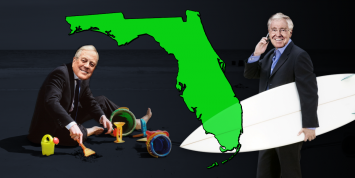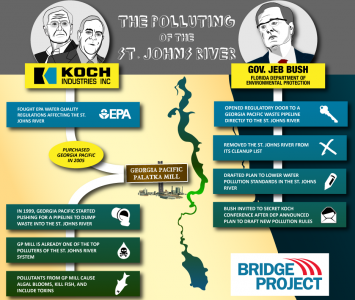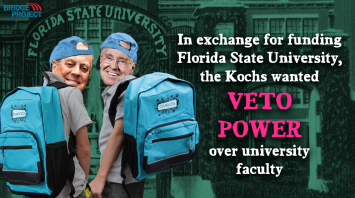Koch Control And Funding Of ALEC And The State Policy Network
Kochs Had Decades-Long Connections With ALEC, Charles Koch Provided “Support” for ALEC; Koch Foundation Kept ALEC Afloat With $400,000 Loan
David Koch Acknowledged That His Family “Exerts Tight Ideological Control” Over The Organizations They Fund. "Many of the organizations funded by the Kochs employ specialists who write position papers that are subsequently quoted by politicians and pundits. David Koch has acknowledged that the family exerts tight ideological control. 'If we’re going to give a lot of money, we’ll make darn sure they spend it in a way that goes along with our intent,' he told Doherty. 'And if they make a wrong turn and start doing things we don’t agree with, we withdraw funding.'” [The New Yorker, 8/30/10]
Charles Koch Said That He Provided “Support” for ALEC, Pacific Research Institute, Heartland Institute, Reason, Competitive Enterprise Institute, Among Others. “I provided the seed money for the Institute for Justice, and support for a wide range of other market-oriented organizations including National Center for Policy Analysis (NCPA), American Legislative Exchange Council (ALEC), National Foundation for Teaching Entrepreneurship (NFTE), Pacific Research Institute, Acton Institute for the Study of Religion and Liberty, Fraser Institute, Reason Magazine, Competitive Enterprise Institute (CEI), and Heartland Institute.” [Creating A Science of Liberty, 1/11/1997]
One Of ALEC’s “Long-Term Liabilities” In 1998 Included A $400,000 Loan From The Koch Foundation. According to ALEC’s 1998 Business Plan, “Entering 1998, ALEC's unaudited balance sheet is currently estimated to reflect $1,727,890 in current assets, including cash of $1,300,000, and $1,266,357 in current liabilities, including accounts payable of $600,000, state scholarships of $368,546, a line of credit for $150,000, and the current portion of certain equipment lease obligations totaling $72,000 . The long-term liabilities total $700,000 and include $440,000 to the Koch Foundation, $70,000 to the Tax Education Support Organization, deferred rent liability of $92,000, and the non-current portion of certain equipment lease obligations, totaling $72,000 .” [ALEC, 11/24/97]
Center for Public Integrity: “The Koch Brothers Have Decades-Long Connections With ALEC,” Gave Brothers Award In 1994. According to The Center for Public Integrity: “The Koch brothers have decades-long connections with ALEC, which gave the brothers the Adam Smith Free Enterprise Award in 1994.” [The Center for Public Integrity, 1/31/2013]
ALEC Launched The Madison Group In 1986, Which Was Renamed to The State Policy Network In 1992
State Policy Network “Originated In 1986 As The Madison Group” Before Changing Name In 1992. According to State Policy Network’s website, “State Policy Network originated in 1986 as the Madison Group, an informal confederation of the state think tanks and their supporters named after the Madison Hotel in Washington, DC, where they first met. In 1992, SPN was established as an independent 501(c)(3) educational organization providing services to its members - the state-focused, free market think tanks and their national think tank partners. At that time, the goal was to encourage cooperation and collaboration among the fledgling state think tank movement, maintaining a basic schedule of meetings and providing advisory services as needed during its first five years of operations. The state policy research community rapidly grew and matured during the 1990s, SPN's Board of Directors realized the need for a stronger organization that would provide additional services. After extensive discussions, the existing Board took a bold and historic step in September 1998, dissolving itself and appointing a transitional Board to fulfill the broader role envisioned for the organization.” [SPN.org, Viewed 1/30/14]
The State Policy Network Was Previously Known As The Madison Group, Was Launched In 1986 By ALEC And Housed In The Chicago-Based Heartland Institute. According to the National Committee for Responsible Philanthropy: “The think tanks are loosely affiliated through the Madison Group, launched by the American Legislative Exchange Council or ALEC (see story, pf 20) and housed in the Chicago-based Heartland Institute. Founded in 1986, the Madison Group acts as a communication link among its 79members, which include not only state think tanks, but also conservative legal foundations and national groups like ALEC, Heritage Foundation and the National Rifle Association.” [National Committee for Responsible Philanthropy, Special Report: Burgeoning Conservative Think Tanks, Spring 1991]
Multiple Members of The Madison Group Were Koch-Founded Or Koch-Controlled Organizations
Multiple Members of The Madison Group Were Koch-Founded Or Koch-Controlled Organizations, Including Citizens for a Sound Economy, Institute for Humane Studies, Reason Foundation, Pacific Research Institute, Heartland Institute, And The Competitive Enterprise Institute. [National Committee for Responsible Philanthropy, Special Report: Burgeoning Conservative Think Tanks, Spring 1991]
The James Madison Institute Was A Member of The Madison Group As of At Least 1991. [National Committee for Responsible Philanthropy, Special Report: Burgeoning Conservative Think Tanks, Spring 1991]
ALEc and SPN Are “Sister Organizations” That Coordinate Extensively Behind Closed Doors Despite Claims of Independence
The Guardian: State Policy Network Is “Sister Organization” of ALEC. According to The Guardian: “One of its former executives was Ted Cruz, now US senator for Texas, who today is the keynote speaker at the national conference in Washington of SPN's sister organisation, the American Legislative Exchange Council (Alec).” [Guardian, 12/5/13]
SPN President Insists Think Tanks Are “Fiercely Independent” But Evidence Indicates That They Coordinate Extensively. According to the New Yorker, “According to a new investigative report by the Center for Media and Democracy, a liberal watchdog group, however, the think tanks are less free actors than a coordinated collection of corporate front groups—branch stores, so to speak—funded and steered by cash from undisclosed conservative and corporate players. Although the think tanks have largely operated under the radar, the cumulative enterprise is impressively large, according to the report. In 2011, the network funneled seventy-nine million dollars into promoting conservative policies at the state level. Tracie Sharp, the president of the S.P.N., promptly dismissed the report as ‘baseless allegations.’ She told Politico, ‘There is no governing organization dictating what free market think tanks research or how they educate the public about good public policy.’ But notes provided to The New Yorker on what was said during the S.P.N.’s recent twenty-first-annual meeting raise doubts about Sharp’s insistence that each of the think tanks is, as she told me, ‘fiercely independent.’ The notes show that, behind closed doors, meeting with some eight hundred people from the affiliated state think tanks, Sharp compared the organization’s model to that of the giant global chain IKEA.” [New Yorker, 11/15/13]
State Policy Network Members’ Combined 2011 Fundraising Was Over $83 Million And Included “Major” Koch Money. According to the Huffington Post, “In 2011, the State Policy Network and its affiliates reported raising a combined $83.2 million, according to the Center for Media and Democracy. While donors to the groups are not required to be disclosed, a 2010 document opened a window on some of them. They included the Donors Trust and the Donors Capital Fund, both secretive right-wing funding instruments, as well as Altria, AT&T, Comcast, GlaxoSmithKline, Kraft Foods, Microsoft, Reynolds American and Time Warner Cable. Multiple documents reviewed in the report also show that the Koch brothers, known for their extensive funding of conservative activist causes, are major funders of the State Policy Network and its affiliates through their linked foundations and Koch Industries. Many other wealthy conservatives have likewise pumped money into the network, including the DeVos family of Amway, the Coors brewing family, the Waltons of Walmart, and wealthy businessman (and North Carolina budget director) Art Pope.” [Huffington Post, 11/14/13]
State Policy Network Is An ALEC Member And Its Think Tanks Submit Model Legislation For Approval At ALEC. According to the Huffington Post, “The State Policy Network and many of its most active affiliates are members of ALEC, the secretive organization that brings corporations, conservative activists and state legislators together to write model state legislation. The network has also routinely sponsored ALEC's annual meetings. […] The think tanks in the State Policy Network also write model legislation and introduce it at private ALEC meetings to be vetted and approved for broader dissemination to statehouses, according to the [Center for Media and Democracy] report.” [Huffington Post, 11/14/13]
The James Madison Institute’s Long Ties to The Madison Group and State Policy Network
Orlando Weekly’s Edward Ericson: “The Madison Institute Is Not A Non-Partisan, Non-Political Idea Mill, But A Sophisticated Mouthpiece For Five Of The State’s Largest Businesses.” According to an opinion by Edward Ericson Jr. for the Orlando Weekly, “But a look at the Madison Institute's funding sources, matched with the ideas promulgated in its research papers, and finally the bills proffered and laws passed by the Legislature, reveal a compelling pattern. In short, the Madison Institute is not a non-partisan, non-political idea mill, but a sophisticated mouthpiece for five of the state's largest businesses, including Florida's largest land owner. The institute is also part of a national network of right-wing public policy centers pushing legislation in every state. None of which should be particularly shocking, but for this: It's illegal.” [Edward Ericson Jr. – Orlando Weekly, 4/27/98]
Ericson: “The Institute Is Also Part Of A National Network Of Right-Wing Public Policy Centers Pushing Legislation In Every State.” According to an opinion by Edward Ericson Jr. for the Orlando Weekly, “But a look at the Madison Institute's funding sources, matched with the ideas promulgated in its research papers, and finally the bills proffered and laws passed by the Legislature, reveal a compelling pattern. In short, the Madison Institute is not a non-partisan, non-political idea mill, but a sophisticated mouthpiece for five of the state's largest businesses, including Florida's largest land owner. The institute is also part of a national network of right-wing public policy centers pushing legislation in every state. None of which should be particularly shocking, but for this: It's illegal.” [Edward Ericson Jr. – Orlando Weekly, 4/27/98]
The State Policy Network Was Founded By Ed Fuelner, The Founding Director Of The Heritage Foundation, In 1984 As “The Madison Group.” According to an opinion by Edward Ericson Jr. in the Orlando Weekly, “In 1984, Ed Fuelner, founding director of the Heritage Foundation, the Washington-based granddaddy of right-wing think tanks, decided that his group's anti-federal ideology needed a companion force to shape lawmaking in the states as federal programs were cut and responsibilities ‘devolved’ to the state level. He envisioned a national network of mini-Heritages that would carry the gospel of ‘free market’ and conservative reforms to state policymakers who, with smaller and less worldly research staffs -- and no countervailing ideas from the left (or even the center) -- would more likely adopt Heritage ideas wholesale. It worked. By 1990, 74 state-level ‘think tanks’ had set up shop in 29 states, including 55 as part of a network called ‘The Madison Group.’” [Edward Ericson Jr. – Orlando Weekly, 4/27/98]
Ericson: A Member Of The State Policy Network “By Law ‘Does Not Attempt To Aid Or Hinder The Passage Of Any Legislation.’” According to an opinion by Edward Ericson Jr. in the Orlando Weekly, “‘We simply will not have power on the national level until we declare war on state legislatures,’ said Don Eberly, president of the Harrisburg, Pa.-based Commonwealth Foundation for Public Policy Alternatives, in an address to the Heritage Foundation in 1990. The Commonwealth Foundation is a member of the Madison Group (now called The State Policy Network, with 54 members), and, like other members, by law ‘does not attempt to aid or hinder the passage of any legislation.’” [Edward Ericson Jr. – Orlando Weekly, 4/27/98]
Ericson: Members Of The James Madison Institute’s Board Had “Parallel Interests In Such Timeless Principles In Reduced Taxes On The Rich, Privatization Of Government Services And Weaker Land Regulation.” According to an opinion by Edward Ericson Jr. for the Orlando Weekly, “Even while funding the institute, some donors lend executives to its board of directors. In 1995 that board included Hoyt Robinson Barnett, vice president of Publix Supermarkets; the late A.D. Davis, of the Winn-Dixie chain; and Jacob C. Belin, the former chairman and still a director of St. Joe. As representatives of some of Florida's most powerful businesses, these men have parallel interests in such timeless principles as reduced taxes on the rich, privatization of government services and weaker land regulation.” [Edward Ericson Jr. – Orlando Weekly, 4/27/98]
- Ericson: “As If By Some ‘Mystical Process,’ The Madison Institute’s Advice Pushes Primarily For Those Things.” According to an opinion by Edward Ericson Jr. in the Orlando Weekly, “As if by some ‘mystical process,’ the Madison Institute's advice pushes primarily for those things. But instead of Jacob Belin telling legislators what he wants, Randall G. Holcombe does it for him. Holcombe is chairman of the Madison Institute's Research Advisory Council and an economics professor at Florida State University. He is an ‘expert’ whose opinion on matters like taxation, presumed to be the result of pure scholarly inquiry, carries more weight than that of a mere rich guy. In effect, the think tanks allow some of Florida's, and America's, wealthiest special interests to cloak their policies in the garb of scientific reason, common sense and populism. And they get a tax write-off for doing it.” [Edward Ericson Jr. – Orlando Weekly, 4/27/98]
Ericson: Think Tanks Like JMI “Allow Some Of Florida’s… Wealthiest Special Interests To Cloak Their Policies In The Garb Of Scientific Reason, Common Sense And Populism. And They Get A Tax Write-Off For Doing It.” According to an opinion by Edward Ericson Jr. in the Orlando Weekly, “As if by some ‘mystical process,’ the Madison Institute's advice pushes primarily for those things. But instead of Jacob Belin telling legislators what he wants, Randall G. Holcombe does it for him. Holcombe is chairman of the Madison Institute's Research Advisory Council and an economics professor at Florida State University. He is an ‘expert’ whose opinion on matters like taxation, presumed to be the result of pure scholarly inquiry, carries more weight than that of a mere rich guy. In effect, the think tanks allow some of Florida's, and America's, wealthiest special interests to cloak their policies in the garb of scientific reason, common sense and populism. And they get a tax write-off for doing it.” [Edward Ericson Jr. – Orlando Weekly, 4/27/98]
Ericson: “The Institute Has Taken The Lead In Putting Several Issues Before The Legislature.” According to an opinion by Edward Ericson Jr. in the Orlando Weekly, “Although not every Madison Institute position paper is draft legislation serving the interests of Big Land, the institute has taken the lead in putting several issues before the Legislature.” [Edward Ericson Jr. – Orlando Weekly, 4/27/98]








